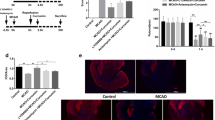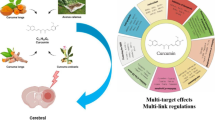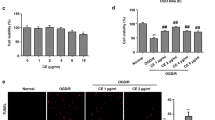Abstract
Curcumin is known to have neuroprotective properties in cerebral ischemia reperfusion (I/R) injury. However, the underlying molecular mechanisms remain largely unknown. Recently, emerging evidences suggested that increased mitochondrial biogenesis enabled preventing I/R injury. Here, we sought to determinate whether curcumin alleviates I/R damage through regulation of mitochondrial biogenesis. Sprague-Dawley rats were subjected to a 2-h period of right middle cerebral artery occlusion followed by 24 h of reperfusion. Prior to onset of occlusion, rats had been pretreated with either low (50 mg/kg, intraperitoneal injection) or high (100 mg/kg, intraperitoneal injection) dose of curcumin for 5 days. Consequently, we found that curcumin pretreatment enabled improving neurological deficit, diminishing infarct volume and increasing the number of NeuN-labeled neurons in the I/R rats. Accordingly, the index of mitochondrial biogenesis including nuclear respiratory factor-1, mitochondrial transcription factor A and mitochondrial number significantly down-regulated in I/R rats were reversed by curcumin pretreatment in a dose-dependent manner, and the mitochondrial uncoupling protein 2 presented the similar change. Taken together, our findings provided novel evidence that curcumin may exert neuroprotective effects by increasing mitochondrial biogenesis.






Similar content being viewed by others
Abbreviations
- I/R:
-
Ischemia reperfusion
- IHC:
-
Immunohistochemistry
- MCAO:
-
Middle cerebral artery occlusion
- NRF-1:
-
Nuclear respiratory factors 1
- OGD:
-
Oxygen glucose deprivation
- PGC-1α:
-
Peroxisome proliferators-activated receptor γ coactivator-1α
- ROS:
-
Reactive oxygen species
- RT:
-
Reverse transcription
- TFAM:
-
Mitochondrial transcription factor A
- TTC:
-
Triphenyltetrazolium chloride
- UCP2:
-
Uncoupling protein 2
References
Chen SD, Yang DI, Lin TK et al (2011) Chuang, roles of oxidative stress, apoptosis, PGC-1α and mitochondrial biogenesis in cerebral ischemia. Int J Mol Sci 12:7199–7215
Chen SD, Lin TK, Yang DI et al (2010) Protective effects of peroxisome proliferator-activated receptors gamma coactivator-1alpha against neuronal cell death in the hippocampal CA1 subfield after transient global ischemia. J Neurosci Res 88:605–613
Mattiasson G, Shamloo M, Gido G et al (2003) Uncoupling protein-2 prevents neuronal death and diminishes brain dysfunction after stroke and brain trauma. Nat Med 9:1062–1068
Niizuma K, Yoshioka H, Chen H et al (2010) Mitochondrial and apoptotic neuronal death signaling pathways in cerebral ischemia. Biochim Biophys Acta 1802:92–99
Franklin JL (2011) Redox regulation of the intrinsic pathway in neuronal apoptosis. Antioxid Redox Signal 14:1437–1448
Rathore P, Dohare P, Varma S et al (2007) Curcuma oil: reduces early accumulation of oxidative product and is anti-apoptogenic in transient focal ischemia in rat brain. Neurochem Res 33:1672–1682
Shukla PK, Khanna VK, Ali MM et al (2008) Anti-ischemic effect of curcumin in rat brain. Neurochem Res 33:1036–1043
Zhao J, Yu S, Zheng W et al (2009) Curcumin improves outcomes and attenuates focal cerebral ischemic injury via antiapoptotic mechanisms in rats. Neurochem Res 35:374–379
Zhuang R, Lin MX, Song QY, Li J (2009) Effects of curcumin on the expression of nuclear factor-kappa B and intercellular adhesion molecular 1 in rats with cerebral ischemia-reperfusion injury. Nan Fang Yi Ke Da Xue Xue Bao 29:1153–1155
Liu ZJ, Liu W, Liu L et al (2013) Curcumin protects neuron against cerebral ischemia-induced inflammation through improving PPAR-gamma function. Evid Based Complement Altern Med 2013:470975
McLeod CJ, Pagel I, Sack MN (2005) The mitochondrial biogenesis regulatory program in cardiac adaptation to ischemia: a putative target for therapeutic intervention. Trends Cardiovasc Med 15:118–123
Zhang Q, Wu Y, Sha H et al (2012) Early exercise affects mitochondrial transcription factors expression after cerebral ischemia in rats. Int J Mol Sci 13:1670–1679
Zhang X, Yan H, Yuan Y et al (2013) Cerebral ischemia-reperfusion-induced autophagy protects against neuronal injury by mitochondrial clearance. Autophagy 9:1321–1333
Kumari S, Anderson L, Farmer S et al (2012) Hyperglycemia alters mitochondrial fission and fusion proteins in mice subjected to cerebral ischemia and reperfusion. Transl Stroke Res 3:296–304
Zhang Q, Wu Y, Zhang P et al (2012) Exercise induces mitochondrial biogenesis after brain ischemia in rats. Neuroscience 205:10–17
Mehta SL, Kumari S, Mendelev N, Li PA (2012) Selenium preserves mitochondrial function, stimulates mitochondrial biogenesis, and reduces infarct volume after focal cerebral ischemia. BMC Neurosci 13:79
Yin W, Signore AP, Iwai M et al (2008) Rapidly increased neuronal mitochondrial biogenesis after hypoxic-ischemic brain injury. Stroke 39:3057–3063
Valerio A, Bertolotti P, Delbarba A et al (2011) Glycogen synthase kinase-3 inhibition reduces ischemic cerebral damage, restores impaired mitochondrial biogenesis and prevents ROS production. J Neurochem 116:1148–1159
Longa EZ, Weinstein PR, Carlson S, Cummins R (1989) Reversible middle cerebral artery occlusion without craniectomy in rats. Stroke 20:84–91
Thiyagarajan M, Sharma SS (2004) Neuroprotective effect of curcumin in middle cerebral artery occlusion induced focal cerebral ischemia in rats. Life Sci 74:969–985
Song W, Huo T, Guo F et al (2013) Globular adiponectin elicits neuroprotection by inhibiting NADPH oxidase-mediated oxidative damage in ischemic stroke. Neuroscience 248C:136–144
Ma M, Uekawa K, Hasegawa Y et al (2013) Pretreatment with rosuvastatin protects against focal cerebral ischemia/reperfusion injury in rats through attenuation of oxidative stress and inflammation. Brain Res 1519:87–94
Ashwal S, Tone B, Tian HR et al (1998) Core and penumbral nitric oxide synthase activity during cerebral ischemia and reperfusion editorial comment. Stroke 29:1037–1047
Fang M, Shen L, Yin H et al (2011) Downregulation of gephyrin in temporal lobe epilepsy neurons in humans and a rat model. Synapse 65:1006–1014
Nisoli E, Falcone S, Tonello C et al (2004) Mitochondrial biogenesis by NO yields functionally active mitochondria in mammals. Proc Natl Acad Sci USA 101:16507–16512
Zhu L, Liu Z, Feng Z et al (2010) Hydroxytyrosol protects against oxidative damage by simultaneous activation of mitochondrial biogenesis and phase II detoxifying enzyme systems in retinal pigment epithelial cells. J Nutr Biochem 21:1089–1098
Mehta SL, Li PA (2009) Neuroprotective role of mitochondrial uncoupling protein 2 in cerebral stroke. J Cereb Blood Flow Metab 29:1069–1078
Liu Y, Chen L, Xu X et al (2009) Both ischemic preconditioning and ghrelin administration protect hippocampus from ischemia/reperfusion and upregulate uncoupling protein-2. BMC Physiol 9:17
Yang C, Zhang X, Fan H, Liu Y (2009) Curcumin upregulates transcription factor Nrf2, HO-1 expression and protects rat brains against focal ischemia. Brain Res 1282:133–141
Jurenka JS (2009) Anti-inflammatory properties of curcumin, a major constituent of curcuma longa: a review of preclinical and clinical research. Altern Med Rev 14:141–153
Izem-Meziane M, Djerdjouri B, Rimbaud S et al (2011) Catecholamine-induced cardiac mitochondrial dysfunction and mPTP opening: protective effect of curcumin. Am J Physiol Heart Circ Physiol 302:H665–H674
Chen SD, Lin TK, Lin JW et al (2010) Activation of calcium/calmodulin-dependent protein kinase IV and peroxisome proliferator-activated receptor gamma coactivator-1alpha signaling pathway protects against neuronal injury and promotes mitochondrial biogenesis in the hippocampal CA1 subfield after transient global ischemia. J Neurosci Res 88:3144–3154
Scarpulla RC (2008) Transcriptional paradigms in mammalian mitochondrial biogenesis and function. Physiol Rev 88:611–638
Puigserver P, Spiegelman BM (2003) Peroxisome proliferator-activated receptor-gamma coactivator 1 alpha (pgc-1 alpha): transcriptional coactivator and metabolic regulator. Endocr Rev 24:78–90
Lee HC, Wei YH (2005) Mitochondrial biogenesis and mitochondrial DNA maintenance of mammalian cells under oxidative stress. Int J Biochem Cell Biol 37:822–834
Ekstrand MI, Falkenberg M, Rantanen A et al (2004) Mitochondrial transcription factor A regulates mtDNA copy number in mammals. Hum Mol Genet 13:935–944
St-Pierre J, Lin J, Krauss S et al (2003) Bioenergetic analysis of peroxisome proliferator-activated receptor γ coactivators 1α and 1β (PGC-1α and PGC-1β) in muscle cells. J Biol Chem 278:26597–26603
Hann SS, Chen J, Wang Z et al (2013) Targeting EP4 by curcumin through cross talks of AMP-dependent kinase alpha and p38 mitogen-activated protein kinase signaling: the role of PGC-1alpha and Sp1. Cell Signal 25:2566–2574
Liu ZJ, Liu W, Liu L et al (2013) Curcumin protects neuron against cerebral ischemia-induced inflammation through improving PPAR-gamma function. Evid Based Complement Altern Med. doi:10.1155/2013/470975
Andrews ZB, Liu ZW, Walllingford N et al (2008) UCP2 mediates ghrelin’s action on NPY/AgRP neurons by lowering free radicals. Nature 454:846–851
Acknowledgments
Our sincere gratitude is extended to Professor Yu Li for technical assistance. This work was supported by the National Science Foundation of China (30500170).
Author information
Authors and Affiliations
Corresponding author
Rights and permissions
About this article
Cite this article
Liu, L., Zhang, W., Wang, L. et al. Curcumin Prevents Cerebral Ischemia Reperfusion Injury Via Increase of Mitochondrial Biogenesis. Neurochem Res 39, 1322–1331 (2014). https://doi.org/10.1007/s11064-014-1315-1
Received:
Revised:
Accepted:
Published:
Issue Date:
DOI: https://doi.org/10.1007/s11064-014-1315-1




